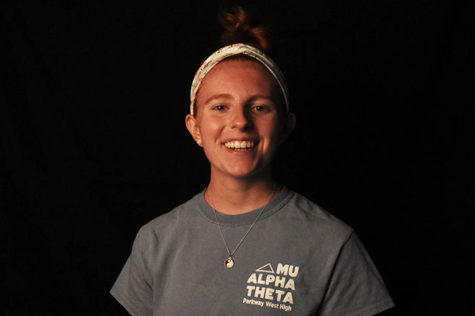Leading into the 2016 presidential election, only 28 percent of Americans are satisfied with the state of the country. The second presidential debate, held at Washington University in St. Louis on Oct. 9, was another chance for GOP Nominee Donald Trump and DNC Nominee Hillary Clinton to make statements about their policy, each other and their own characters.
“Donald Trump is kind of loud and he doesn’t have a filter, but Hillary Clinton is a stereotypical politician; she really doesn’t have her own beliefs, or she suppresses her own beliefs in order to win,” junior Ryan Hidalgo said.
The media was abuzz in recent weeks covering the fallout from the release of a 2005 recording of Trump talking derogatively about women. The tape has caused many Republicans to renounce their support for him as well, and was brought up at the debate on Oct. 9.
“I guess you can compare him to Ronald Reagan in a sense, that he’s sort of the ‘Teflon Candidate’ where nothing sticks to him; not because he’s blameless but because there’s so many different scandals,” senior Brian Zhang said.
One of the biggest scandals surrounding the Trump campaign since the primary season has been his rhetoric about Muslims and the threat of terrorism. Trump has called for a temporary ban on all Muslims entering the United States,
“When Trump was talking about Muslims, there was a Muslim girl in the audience who asked a question. He wouldn’t even look her in the eyes,” sophomore Allani Gordon said. “He was [implying all] Muslims are radical terrorists and I think as a presidential candidate that’s really unprofessional to generalize a group like that.”
The Clinton campaign has not escaped scandal either, with Clinton herself being called to give 11 hours of testimony to a Congressional Committee on her role in the events that led four Americans to be killed in Benghazi, Libya in 2012.
“She’s like a more magnified version of Obama, the same scandals keep on sticking to her, like Benghazi, the email scandal and the Clinton Foundation. These have been scandals since the beginning of her run on the Democratic primary ticket, way earlier in the election season,” Zhang said.
This question and several others were allowed by debate moderators Martha Raddatz and Anderson Cooper, the town hall format permitting them to allow questions from an audience of undecided voters as well as their own, and the order in which to ask them.
“I really liked the last question [from an audience member]: if they had anything nice to say to each other,” freshmen Landon DuPont said. “I thought Hillary Clinton’s compliment towards Trump wasn’t really a compliment towards him, it was like a sideways compliment, whereas his was more directed towards her, that she doesn’t give up and she’s a fighter. Hers was kind of diverted towards his children….I don’t necessarily think that she answered the question correctly.”
Trump and Clinton then shook hands as the debate came to a close and major news outlets began polling the public about how they thought it went. According to a poll by NBC News, 56 percent of people who watched the debate had negative feelings about Clinton, and 63 percent had negative feelings about Trump.
“I don’t know if there were any good points [in the second debate], it was kind of just sad in general,” Hidalgo said. “It was sad because out of everybody in the country, those were the best two people that we decided to pick to potentially be our next president. It really hurts the general public’s faith in government.”


![Gazing up from the stage, junior Joseph McCurdy who played Peter Pan in the school play, Lost Girl, sits next to senior Juliana Rogers, who plays Wendy Darling, during a theater rehearsal. McCurdy’s passion for theater began when he observed a West High production in middle school. “I've been in the high school theater program since I was a freshman. I've always loved theater, but [what prompted me to join] was [when] I went to see [a performance here] when I was in middle school, and it was super cool,” McCurdy said.](https://pwestpathfinder.com/wp-content/uploads/2025/11/IMG_6535-1200x798.jpeg)

![Standing tall, stacked in a precise formation, the cheer team strikes a signature pose during halftime on Sept. 12 at the varsity football game. Nearly a month after this performance, the cheer team performed at the Missouri Cheerleading Coaches Association (MCCA) regional competition on Oct. 4, 2025. “We've all come [to] work together a lot more,” sophomore Elyssa Philippi said. “We're a lot closer than we were [earlier in the season] and going to state has made us closer [in] trying to work with each other, learn [new] skills and make our team better.”](https://pwestpathfinder.com/wp-content/uploads/2025/11/DSC5139-1.jpg)
![Handing out candy to excited trunk-or-treaters, President of the United Nations Children’s Fund club and junior Sara Ashok represents that group. Ashok was eager to participate in this event for multiple reasons. “I really wanted to be a part of the event because I get to help create memories for kids and spend time with my friends, spreading the things [I'm passionate about],” Ashok said.](https://pwestpathfinder.com/wp-content/uploads/2025/11/DSC_8648-1-1200x800.jpg)

![Smiling in a sea of Longhorns, Fox 2 reporter Ty Hawkins joins junior Darren Young during the morning Oct. 3 pep rally. The last time West was featured in this segment was 2011. “[I hope people see this and think] if you come to [Parkway] West, you will have the time of your life because there are so many fun activities to do that make it feel like you belong here. I was surprised so many people attended, but it was a lot of fun,” Young said.](https://pwestpathfinder.com/wp-content/uploads/2025/10/Edited2-1200x798.jpg)
![West High seniors and families listen as a representative of The Scholarship Foundation of St. Louis, Teresa Steinkamp, leads a Free Application for Federal Student Aid (FAFSA) workshop. This session, held in the library, provided guidance on financial aid, scholarships and student loan options. “This event is very beneficial for any seniors who are applying to or considering applying to colleges after high school [because] the cost of college is on the rise for seniors and parents,” college and career counselor Chris Lorenz said.](https://pwestpathfinder.com/wp-content/uploads/2025/09/DSC_4478-1200x778.jpg)
![Senior Kamori Berry walks across the field during halftime at the Homecoming football game on Sept. 12. During the pep assembly earlier that day, she was pronounced Homecoming Queen. “I thought it was nice that the crowd [started] cheering right away. I know [my friends] were really excited for me, and my family was happy because typically non-white people don't win,” Berry said.](https://pwestpathfinder.com/wp-content/uploads/2025/09/DSC7046-Enhanced-NR-1200x798.jpg)


